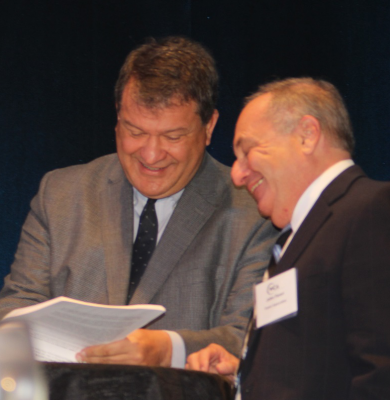Traffic, Use of Green Energy Prime Concerns at North 60 Hearing

Community members pushed for traffic mitigation measures and the use of geothermal and renewable energy for the proposed North 60 development during last Thursday’s start of the public hearing on the Draft Environmental Impact Statement (DEIS).
A majority of the 10 area residents who spoke during the live-streamed hearing stressed to the Mount Pleasant Planning Board and Fareri Associates, the developer of the three million square-foot, $1.2 billion project on the Grasslands campus near Westchester Medical Center, the importance of resolving those issues.
About 2,144,000 square feet will be biotech and research space along with medical offices, retail, a science museum and a hotel. Westchester officials reached an agreement with developer John Fareri in January 2019 on a 99-year lease for the county’s 60 acres at the site. Fareri owns another 20 acres adjacent to the county’s parcel.
Richard Wisniewski, a resident of Philip Place in Hawthorne, said the state Department of Transportation (DOT) currently has no major improvements planned for the area around the site, which is problematic.
“I really don’t think that’s a wise way of approaching this project,” Wisniewski said. “This entire project is predicated on the surrounding infrastructure being adequate to handle all this additional volume and I don’t think that’s a prudent way to approach this.”
Traffic analyses estimate an additional 1,854 vehicles entering or exiting the site during the weekday morning peak hour and 2,104 trips in the weekday afternoon peak hour once the site is fully operational, said Gina Martini, project manager for the planning and engineering firm VHB, which is working on behalf of the developer.
Another resident, Dominick Vita of Hawthorne, asked the applicant and the Planning Board to find a way to mitigate construction traffic and also manage the influx of cars after full buildout.
“It’s a huge number of vehicles, so I would want to know what the plan is for managing that and how that is going to affect our neighborhood, specifically, since we’re right near there,” Vita said.
Several area residents who identified themselves as volunteers for Mothers Out Front, an organization that advocates for a livable climate for future generations, called for the project to use geothermal and solar rather than natural gas.
“Geothermal is cleaner and safer and a better alternative and it also makes financial sense because there’s a lot of financial incentives available now both from the state and the utility companies, and it’s the long-term plan that this development is going for,” said Tarrytown resident Amy Hill. “They’re going to have to look at it later, so it makes sense for the health of our community and for the financial benefit of the development and for the climate.”
Steven Kavee, the chair of Mount Pleasant’s Conservation Advisory Council, said there are many positive aspects to the project, most notably the extensive wetlands restoration that is planned and the commitment by the applicant to use native plants. Maintaining nearly 54 percent of the site as open space is also an advantage.
However, Kavee pointed to several concerns he had, particularly relating to environmental issues. He said that while the applicant intends to build to a LEED Silver standard, Kavee called it “a pretty low bar” to attain.
Kavee also said that there is too much surface parking during the various construction phases, which is expected to take 10 to 20 years to complete. Eliminating the use of pesticides should also be done.
“This is a good move for this piece of property that obviously the town and the county support,” Kavee said of the project. “I think there are some measures that the applicant can take, that the DEIS should address, to really be consistent with this kind of smart growth that is envisioned.”
Fareri Associates plans to build the project in multiple phases. The first phase will see the construction of 220,000 square feet of biotech and research space, 100,000 square feet of medical offices, the 100,000-square-foot hotel and 80,000 square feet of retail, said Kevin Molnar, director of design for Fareri Associates.
The 80 acres is located on the north side of Hospital Road, to the south and east of Saw Mill River Road, the south side of Stevens Avenue West and the west side of the Sprain Brook Parkway. The site would have a main street with a connector road from Route 9A to Hospital Road, Molnar said.
The project is estimated to generate $9.2 million in real estate taxes for the county, town and the Mount Pleasant and Pocantico Hills school districts and about $7 million in annual rent for Westchester, Martini said. There would be 1,000 new construction jobs and an estimated 1,133 employees at the site when complete. Construction of the first phase of the project could take up to five years, she said.
Planning Board Chairman Michael McLaughlin said the project’s review is in the early stages, giving the public plenty of opportunities to address concerns.
“This is the very beginning,” McLaughlin said. “This is the second step of a process that’s going to take a long time.”
The hearing was adjourned until the board’s Oct. 1 meeting. The public may submit written comments to the Planning Board by sending them to Town Hall, 1 Town Hall Plaza, Valhalla, N.Y. 10595 or by e-mail at csaracino@mtpleasantny.com. The DEIS can be viewed by visiting http://projects.vhb.com/thenorth60.

Martin has more than 30 years experience covering local news in Westchester and Putnam counties, including a frequent focus on zoning and planning issues. He has been editor-in-chief of The Examiner since its inception in 2007. Read more from Martin’s editor-author bio here. Read Martin’s archived work here: https://www.theexaminernews.com/author/martin-wilbur2007/
